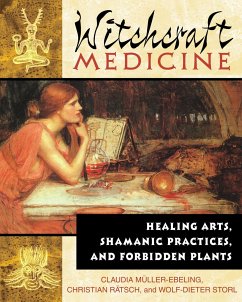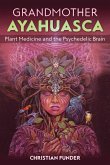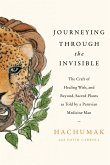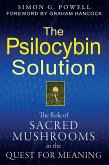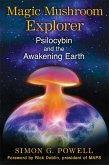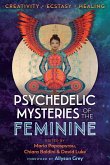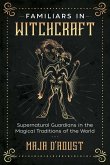Claudia Muller-Ebeling, Christian Ratsch, Wolf-Dieter Storl
Witchcraft Medicine
Healing Arts, Shamanic Practices, and Forbidden Plants
19,99 €
inkl. MwSt.
Versandfertig in über 4 Wochen

10 °P sammeln
Claudia Muller-Ebeling, Christian Ratsch, Wolf-Dieter Storl
Witchcraft Medicine
Healing Arts, Shamanic Practices, and Forbidden Plants
- Broschiertes Buch
- Merkliste
- Auf die Merkliste
- Bewerten Bewerten
- Teilen
- Produkt teilen
- Produkterinnerung
- Produkterinnerung
In "Witchcraft Medicine" the authors examine the women who mix the potions and become the healers, the legacy of Hecate, the sorceress as shaman, and the plants associated with the solstice and Halloween. They also look at the history of forbidden medicine, with an eye toward how the sacred plants of our forebears can be used once again.
An in-depth investigation of traditional European folk medicine and the healing arts of witches.
Andere Kunden interessierten sich auch für
![Dreaming Wide Awake Dreaming Wide Awake]() David Jay BrownDreaming Wide Awake20,99 €
David Jay BrownDreaming Wide Awake20,99 €![Grandmother Ayahuasca Grandmother Ayahuasca]() Christian FunderGrandmother Ayahuasca16,99 €
Christian FunderGrandmother Ayahuasca16,99 €![Journeying Through the Invisible Journeying Through the Invisible]() HachumakJourneying Through the Invisible22,99 €
HachumakJourneying Through the Invisible22,99 €![The Psilocybin Solution The Psilocybin Solution]() Simon G. PowellThe Psilocybin Solution23,99 €
Simon G. PowellThe Psilocybin Solution23,99 €![Magic Mushroom Explorer Magic Mushroom Explorer]() Simon G. PowellMagic Mushroom Explorer15,99 €
Simon G. PowellMagic Mushroom Explorer15,99 €![Psychedelic Mysteries of the Feminine Psychedelic Mysteries of the Feminine]() Psychedelic Mysteries of the Feminine16,99 €
Psychedelic Mysteries of the Feminine16,99 €![Familiars in Witchcraft Familiars in Witchcraft]() Maja D'AoustFamiliars in Witchcraft20,99 €
Maja D'AoustFamiliars in Witchcraft20,99 €-
-
-
In "Witchcraft Medicine" the authors examine the women who mix the potions and become the healers, the legacy of Hecate, the sorceress as shaman, and the plants associated with the solstice and Halloween. They also look at the history of forbidden medicine, with an eye toward how the sacred plants of our forebears can be used once again.
An in-depth investigation of traditional European folk medicine and the healing arts of witches.
Hinweis: Dieser Artikel kann nur an eine deutsche Lieferadresse ausgeliefert werden.
An in-depth investigation of traditional European folk medicine and the healing arts of witches.
Hinweis: Dieser Artikel kann nur an eine deutsche Lieferadresse ausgeliefert werden.
Produktdetails
- Produktdetails
- Verlag: Inner Traditions Bear and Company
- Seitenzahl: 272
- Erscheinungstermin: 1. Oktober 2003
- Englisch
- Abmessung: 253mm x 204mm x 17mm
- Gewicht: 686g
- ISBN-13: 9780892819713
- ISBN-10: 0892819715
- Artikelnr.: 21546282
- Herstellerkennzeichnung
- Libri GmbH
- Europaallee 1
- 36244 Bad Hersfeld
- gpsr@libri.de
- Verlag: Inner Traditions Bear and Company
- Seitenzahl: 272
- Erscheinungstermin: 1. Oktober 2003
- Englisch
- Abmessung: 253mm x 204mm x 17mm
- Gewicht: 686g
- ISBN-13: 9780892819713
- ISBN-10: 0892819715
- Artikelnr.: 21546282
- Herstellerkennzeichnung
- Libri GmbH
- Europaallee 1
- 36244 Bad Hersfeld
- gpsr@libri.de
Claudia Müller-Ebeling, Ph.D., is an art historian and anthropologist and coauthor, with Christian Rätsch, of Shamanism and Tantra in the Himalayas, Witchcraft Medicine, and Pagan Christmas. She lives in Hamburg, Germany.
Introduction: Is Witchcraft Medicine Good Medicine?
WOLF-DIETER STORL
1. The Wild Earth and Its Children
The Power of the Wilderness
Divine Visitors to the Small Cultural Island
Midsummer's Dream
The August Festival
The Equinox
The Time of the Dead: Samhain, Halloween
Rites of Initiation
2. The Old Woman in the Hedgerow
The Chimney
The Wrath of Venus
The New Science
3. The Witch As Shaman
Devil Worship
The Buck: The Divine Dispenser
The World Tree
The Flight to the Holy Mountain
Flying Ointment
Sex and Fertility Magic
Weather Magic
4. Midwives: Fertility and Birth
The Way into Existence
The Children's Springs at Lolarka Kund
The Time of Begetting
Pregnancy
Birth
The Hebe-Ahnin and the Men's Childbed
After the Birth
5. The Mother of Death
Flowers for the Dead
The Festival of the Dead
The Dead and the Vegetation
The Dead As Dispensers of Fertility
CHRISTIAN RÄTSCH
6. Witchcraft Medicine: the Legacy of Hecate
Gardens of the Gods and Herbs of the Witches
The Garden of the Great Goddess
The Garden of Hecate
The Garden of Medea
The Garden of Circe
The Garden of Artemis
Flying Ointments and Lovers' Salves As Medicine
Pharmakon Wine
CLAUDIA MÜLLER-EBELING
7. Images of Witches: The Demonization of Nature's Healing Powers
The Image of the Witch
Mary: The Chaste Cultural Heroine
The Witch: The Sensuous Natural Woman
The Demonization of Nature and Sensuality
Sinister Companions of the Witch
Poison Mixers and Healers
The Demonization of Medicinal and Poisonous Plants
The Healing of the Microcosm and Macrocosm
Rübezahl: Herbalist and Weather God
Seeress and Goddess of Fate
From the Goddess to the Witch
The Witch As the Temptation of Saint Anthony
Saturn: Master of the Witches
The Painters of Witches
CHRISTIAN RÄTSCH
8. Witchcraft Medicine: Forbidden Medicine-From the Inquisition to the Drug
Laws
Coca and Cocaine
Poppy and Opium
Mescaline and Psilocybin: The Forbidden Souls of the Gods
Ayahuasca: The Conquest Is Not Over
The "Drug" Business
News Update: Hemp Seeds Outlawed!
Appendix: Plants Associated with Witches and Devils
Bibliography
Index
WOLF-DIETER STORL
1. The Wild Earth and Its Children
The Power of the Wilderness
Divine Visitors to the Small Cultural Island
Midsummer's Dream
The August Festival
The Equinox
The Time of the Dead: Samhain, Halloween
Rites of Initiation
2. The Old Woman in the Hedgerow
The Chimney
The Wrath of Venus
The New Science
3. The Witch As Shaman
Devil Worship
The Buck: The Divine Dispenser
The World Tree
The Flight to the Holy Mountain
Flying Ointment
Sex and Fertility Magic
Weather Magic
4. Midwives: Fertility and Birth
The Way into Existence
The Children's Springs at Lolarka Kund
The Time of Begetting
Pregnancy
Birth
The Hebe-Ahnin and the Men's Childbed
After the Birth
5. The Mother of Death
Flowers for the Dead
The Festival of the Dead
The Dead and the Vegetation
The Dead As Dispensers of Fertility
CHRISTIAN RÄTSCH
6. Witchcraft Medicine: the Legacy of Hecate
Gardens of the Gods and Herbs of the Witches
The Garden of the Great Goddess
The Garden of Hecate
The Garden of Medea
The Garden of Circe
The Garden of Artemis
Flying Ointments and Lovers' Salves As Medicine
Pharmakon Wine
CLAUDIA MÜLLER-EBELING
7. Images of Witches: The Demonization of Nature's Healing Powers
The Image of the Witch
Mary: The Chaste Cultural Heroine
The Witch: The Sensuous Natural Woman
The Demonization of Nature and Sensuality
Sinister Companions of the Witch
Poison Mixers and Healers
The Demonization of Medicinal and Poisonous Plants
The Healing of the Microcosm and Macrocosm
Rübezahl: Herbalist and Weather God
Seeress and Goddess of Fate
From the Goddess to the Witch
The Witch As the Temptation of Saint Anthony
Saturn: Master of the Witches
The Painters of Witches
CHRISTIAN RÄTSCH
8. Witchcraft Medicine: Forbidden Medicine-From the Inquisition to the Drug
Laws
Coca and Cocaine
Poppy and Opium
Mescaline and Psilocybin: The Forbidden Souls of the Gods
Ayahuasca: The Conquest Is Not Over
The "Drug" Business
News Update: Hemp Seeds Outlawed!
Appendix: Plants Associated with Witches and Devils
Bibliography
Index
Introduction: Is Witchcraft Medicine Good Medicine?
WOLF-DIETER STORL
1. The Wild Earth and Its Children
The Power of the Wilderness
Divine Visitors to the Small Cultural Island
Midsummer's Dream
The August Festival
The Equinox
The Time of the Dead: Samhain, Halloween
Rites of Initiation
2. The Old Woman in the Hedgerow
The Chimney
The Wrath of Venus
The New Science
3. The Witch As Shaman
Devil Worship
The Buck: The Divine Dispenser
The World Tree
The Flight to the Holy Mountain
Flying Ointment
Sex and Fertility Magic
Weather Magic
4. Midwives: Fertility and Birth
The Way into Existence
The Children's Springs at Lolarka Kund
The Time of Begetting
Pregnancy
Birth
The Hebe-Ahnin and the Men's Childbed
After the Birth
5. The Mother of Death
Flowers for the Dead
The Festival of the Dead
The Dead and the Vegetation
The Dead As Dispensers of Fertility
CHRISTIAN RÄTSCH
6. Witchcraft Medicine: the Legacy of Hecate
Gardens of the Gods and Herbs of the Witches
The Garden of the Great Goddess
The Garden of Hecate
The Garden of Medea
The Garden of Circe
The Garden of Artemis
Flying Ointments and Lovers' Salves As Medicine
Pharmakon Wine
CLAUDIA MÜLLER-EBELING
7. Images of Witches: The Demonization of Nature's Healing Powers
The Image of the Witch
Mary: The Chaste Cultural Heroine
The Witch: The Sensuous Natural Woman
The Demonization of Nature and Sensuality
Sinister Companions of the Witch
Poison Mixers and Healers
The Demonization of Medicinal and Poisonous Plants
The Healing of the Microcosm and Macrocosm
Rübezahl: Herbalist and Weather God
Seeress and Goddess of Fate
From the Goddess to the Witch
The Witch As the Temptation of Saint Anthony
Saturn: Master of the Witches
The Painters of Witches
CHRISTIAN RÄTSCH
8. Witchcraft Medicine: Forbidden Medicine-From the Inquisition to the Drug
Laws
Coca and Cocaine
Poppy and Opium
Mescaline and Psilocybin: The Forbidden Souls of the Gods
Ayahuasca: The Conquest Is Not Over
The "Drug" Business
News Update: Hemp Seeds Outlawed!
Appendix: Plants Associated with Witches and Devils
Bibliography
Index
WOLF-DIETER STORL
1. The Wild Earth and Its Children
The Power of the Wilderness
Divine Visitors to the Small Cultural Island
Midsummer's Dream
The August Festival
The Equinox
The Time of the Dead: Samhain, Halloween
Rites of Initiation
2. The Old Woman in the Hedgerow
The Chimney
The Wrath of Venus
The New Science
3. The Witch As Shaman
Devil Worship
The Buck: The Divine Dispenser
The World Tree
The Flight to the Holy Mountain
Flying Ointment
Sex and Fertility Magic
Weather Magic
4. Midwives: Fertility and Birth
The Way into Existence
The Children's Springs at Lolarka Kund
The Time of Begetting
Pregnancy
Birth
The Hebe-Ahnin and the Men's Childbed
After the Birth
5. The Mother of Death
Flowers for the Dead
The Festival of the Dead
The Dead and the Vegetation
The Dead As Dispensers of Fertility
CHRISTIAN RÄTSCH
6. Witchcraft Medicine: the Legacy of Hecate
Gardens of the Gods and Herbs of the Witches
The Garden of the Great Goddess
The Garden of Hecate
The Garden of Medea
The Garden of Circe
The Garden of Artemis
Flying Ointments and Lovers' Salves As Medicine
Pharmakon Wine
CLAUDIA MÜLLER-EBELING
7. Images of Witches: The Demonization of Nature's Healing Powers
The Image of the Witch
Mary: The Chaste Cultural Heroine
The Witch: The Sensuous Natural Woman
The Demonization of Nature and Sensuality
Sinister Companions of the Witch
Poison Mixers and Healers
The Demonization of Medicinal and Poisonous Plants
The Healing of the Microcosm and Macrocosm
Rübezahl: Herbalist and Weather God
Seeress and Goddess of Fate
From the Goddess to the Witch
The Witch As the Temptation of Saint Anthony
Saturn: Master of the Witches
The Painters of Witches
CHRISTIAN RÄTSCH
8. Witchcraft Medicine: Forbidden Medicine-From the Inquisition to the Drug
Laws
Coca and Cocaine
Poppy and Opium
Mescaline and Psilocybin: The Forbidden Souls of the Gods
Ayahuasca: The Conquest Is Not Over
The "Drug" Business
News Update: Hemp Seeds Outlawed!
Appendix: Plants Associated with Witches and Devils
Bibliography
Index
